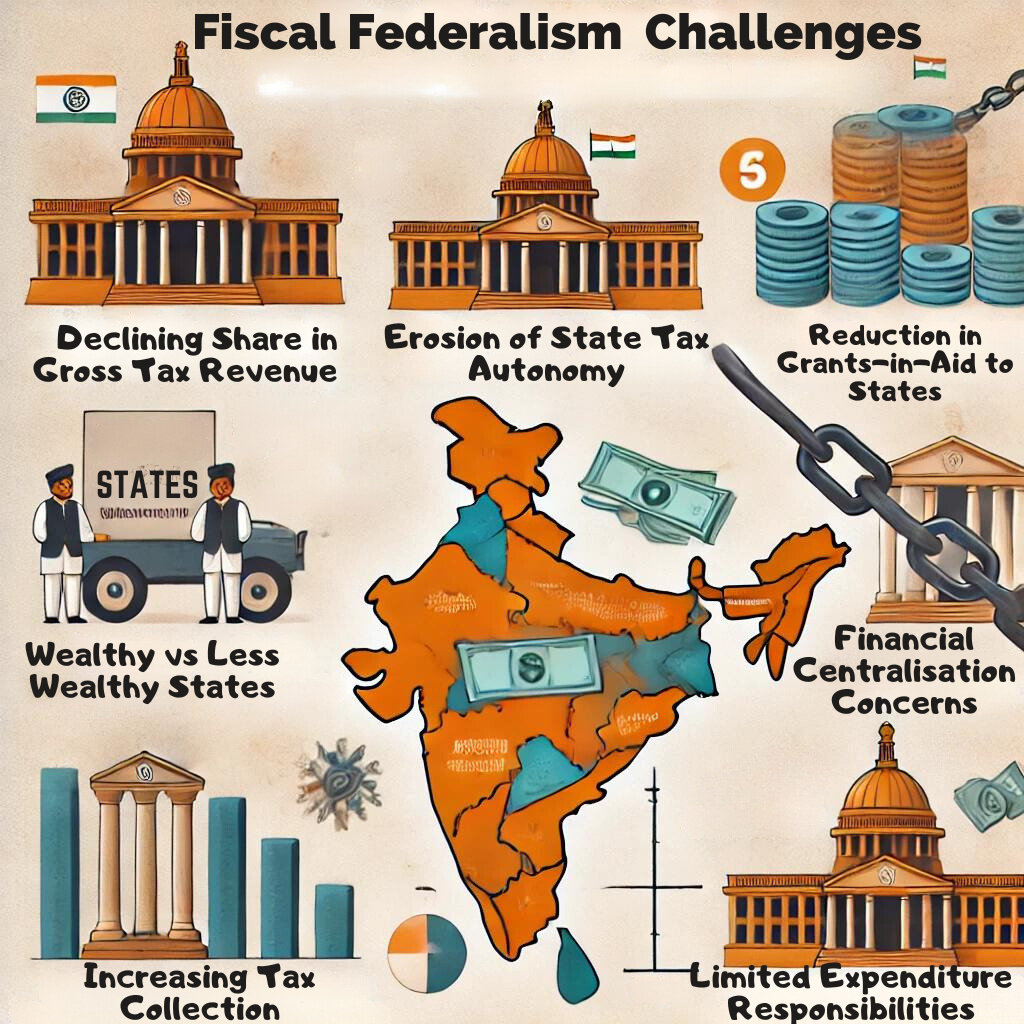Fiscal federalism in India is key to balancing the financial autonomy of the center and states. It promotes equitable resource distribution and strengthens democratic governance through local decision-making. The Indian Constitution has mechanisms like shared taxes and grants-in-aid to address regional imbalances, supported by institutions such as Finance Commissions.
Recent reforms have significantly changed fiscal relations between the Union and states. These include the abolition of the Planning Commission, the establishment of NITI Aayog, and constitutional amendments for GST. The Union Budget for 2024-25 aims to achieve “developed-country” status by India’s centenary, accommodating coalition demands to foster cooperative federalism.
The Constitution outlines financial relations between the center and states through various articles. Article 269A covers GST on inter-state trade, while Article 275 allows the central government to transfer funds for specific purposes. Article 280 mandates the Finance Commission to recommend tax revenue distribution. The Seventh Schedule delineates taxation powers between the center and states.
Origin of the Article
This editorial is based on “Union Budget 2024: Fiscal balance amid coalition compromises” published in Business Standard on 25/07/2024. The article reviews the first budget of the 18th Lok Sabha.
Relevancy for UPSC Students
For UPSC students, understanding fiscal federalism is crucial as it touches upon various aspects of the UPSC syllabus, including Indian polity, governance, and economic development. This knowledge helps in grasping the complexities of center-state relations and the impact of coalition politics on policy-making.

Why in News
The topic of fiscal federalism amidst coalition politics is crucial for UPSC civil services exam preparation due to its relevance in understanding the dynamics of Centre-State financial relations. Previous UPSC questions have explored aspects of federalism and the distribution of financial powers, making this topic highly pertinent for both prelims and mains. The 2024 Union Budget’s attempt to balance long-term goals with coalition demands highlights the practical challenges and significance of cooperative federalism in India’s democratic setup. This insight aids aspirants in grasping the complexities of policy-making and governance.
Constitutional Provisions Related to Centre-State Financial Relations
The Indian Constitution lays out specific provisions for the financial relationship between the Centre and the states to ensure balanced development across the federation. These provisions include the roles of various constitutional bodies, like the Finance Commission. Understanding these mechanisms is crucial for appreciating how financial resources are distributed and managed between different levels of government.
Constitutional Framework (Part XII)
The Indian Constitution provides a robust framework for Centre-State financial relations under Part XII. Articles 268 to 293 outline the distribution of taxes, non-tax revenues, borrowing powers, and grants-in-aid. This structure ensures equitable resource distribution, enabling states to meet their financial needs while maintaining a balance of power between the Centre and the States.
Article 269A (Goods and Services Tax – GST)
The Constitution (101st Amendment) Act, of 2016 introduced GST, a significant reform in India’s tax structure. Article 269A mandates that GST on inter-state trade is collected by the central government and shared between the Centre and States based on recommendations from the GST Council. This provision aims to streamline tax collection and promote uniformity in tax rates across the country.
Article 275 (Post Devolution Revenue Deficit Grants)
Article 275 empowers the central government to allocate funds to state governments for specific purposes, addressing revenue deficits post-devolution. This discretionary financial support helps states manage fiscal shortfalls and fund developmental projects, ensuring balanced regional growth and financial stability across the nation.
Article 280 (The Finance Commission)
The Finance Commission, established under Article 280, plays a critical role in recommending the distribution of tax revenues between the Centre and States. It also advises on measures to improve state finances, ensuring fiscal discipline and stability. The commission’s recommendations help maintain a balanced fiscal federal structure.
The Seventh Schedule
The Seventh Schedule of the Constitution delineates taxation powers between the Centre and States. The Union List grants exclusive taxation authority to Parliament, while the State List provides similar powers to state legislatures. The Concurrent List allows both to levy taxes on specific subjects, ensuring a clear division of fiscal responsibilities.
Challenges of Fiscal Federalism in India

Declining Share in Gross Tax Revenue
Despite Finance Commissions recommending 42% and 41% of net tax revenue for states, their share of gross tax revenue has declined significantly. From 35% in 2015-16 to 30% in 2023-24, this reduction undermines states’ fiscal capabilities. The projected growth in Gross Tax Revenue (GTR) for 2024-25 necessitates a reevaluation of states’ revenue shares.
Erosion of State Tax Autonomy
The adoption of VAT and GST has limited states’ ability to set independent tax rates. This erosion of tax autonomy restricts states from tailoring fiscal policies to local economic conditions. Moreover, delays in GST compensation disbursements have further strained state finances, highlighting the need for timely fiscal support.
Reduction in Grants-in-Aid to States
Grants-in-aid to states have decreased from Rs 1.95 lakh crore in 2015-16 to Rs 1.65 lakh crore in 2023-24. This reduction has led to a decline in statutory financial transfers’ proportion to the Union’s gross tax revenue, impacting states’ ability to fund essential services and developmental projects.
Increasing Tax Collection Under Cess and Surcharge Categories
The rise in revenue collection through cess and surcharge has reduced states’ share of gross revenue. Excluding GST cess until June 2022, these collections have grown significantly, diminishing the net tax revenue available for distribution to states and affecting their fiscal health.
Financial Centralisation Concerns
The Union government influences states’ fiscal priorities through Centrally Sponsored Schemes (CSS) and Central Sector Schemes (CS). Between 2015-16 and 2023-24, CSS allocation increased substantially, compelling states to match Union funds, which often strains their financial resources.
Issues Surrounding Wealthy vs Less Wealthy States
Wealthier states can independently fund CSS matching grants, whereas less affluent states rely on borrowing, increasing fiscal liabilities. This disparity exacerbates inter-state inequality, with wealthier states benefiting more from central schemes, while poorer states struggle to meet financial requirements.
Larger Financial Powers of Union Govt with Limited Expenditure Responsibilities
Despite transferring less than 50% of gross tax revenue to states, the Union government maintains a significant fiscal deficit of 5.9% of GDP. This imbalance grants substantial financial authority to the Union while limiting its expenditure responsibilities, constraining states’ fiscal space.
Impact of Coalition Politics on Fiscal Federalism
Coalition politics often influence fiscal federalism, as varied regional parties in a coalition can demand specific financial concessions, affecting national fiscal policies. This dynamic can lead to complexities in budget allocations and fiscal transfers, impacting overall economic governance.
Positive Impacts
Coalition politics can enhance states’ bargaining power, leading to more favorable central transfers and increased fiscal autonomy. For instance, budgetary allocations for regional projects, like road infrastructure in Bihar and capital development in Andhra Pradesh, reflect coalition dynamics influencing central funding decisions.
Negative Impacts
Coalition politics can lead to fiscal indiscipline, with excessive spending and populist measures compromising fiscal stability. Delayed decision-making and potential misuse of funds also pose risks, as coalition governments may struggle to reach a consensus on crucial fiscal policies, affecting long-term economic planning.
PESTEL Analysis
| Political: The Union Budget reflects a significant political balancing act, influenced by coalition dynamics. Coalition politics enhances regional parties’ bargaining power, impacting fiscal policies through increased demand for favorable revenue-sharing terms. However, these dynamics can also lead to fiscal indiscipline and delays in policy implementations, as compromises and consensus are needed to maintain political stability. Economic: Fiscal federalism is crucial for equitable economic development across states. Recent shifts, such as increased tax devolution and the introduction of GST, aim to streamline economic transactions but have reduced state tax autonomy. Centralized control over significant financial resources and schemes can hinder tailored economic strategies by states, affecting localized economic growth. Social: Diverse social needs across India require decentralized fiscal policies to effectively address local demands. Fiscal federalism under coalition politics sometimes ensures better alignment of central funds with local needs, promoting regional development and reducing disparities. However, the centralization of financial powers can undermine these efforts by limiting states’ abilities to cater to specific social challenges. Technological: The editorial does not explicitly address technological aspects within fiscal federalism. However, advancements in financial technologies and data management could enhance the transparency and efficiency of fiscal transfers and resource allocation processes. Environmental: There is limited mention of environmental considerations within the fiscal framework. Nonetheless, fiscal policies can incorporate environmental sustainability by providing states with the autonomy and resources necessary to address local environmental issues and promote sustainable practices. Legal: The fiscal relationship between the Centre and states is framed by constitutional provisions, including articles governing tax distribution and financial powers. Ensuring legal compliance and adapting legal frameworks to support cooperative federalism is critical for maintaining a balanced fiscal structure that respects both central oversight and state autonomy. |
Way Forward
Promoting Competitive Federalism
To complement cooperative federalism, competitive federalism should be promoted. Benchmarking performance indicators and incentive-based resource allocation can drive states to improve governance and attract investments, fostering healthy competition and efficient resource utilization.
Reform the Finance Commission and Tax Sharing Mechanisms
Reforming the Finance Commission’s tax-sharing principles is crucial. Redefining the divisible pool to include IGST and revising criteria for horizontal devolution can better align with India’s evolving fiscal landscape, ensuring fairer resource distribution among states.
Enhance the Institutional Framework
Establishing a formal relationship between the GST Council and the Finance Commission will ensure coordinated decision-making on fiscal matters. Empowering the Inter-State Council can facilitate dialogue and consensus-building, promoting cooperative fiscal management between the Centre and states.
Improve Fiscal Transfers and Grants
Redesigning the grant mechanism under Article 275 and restructuring intergovernmental transfers can promote equity and address fiscal imbalances. Clear guidelines for central fund distribution will enhance transparency and reduce discretionary powers, ensuring fairer financial support for states.
Implement Robust Anti-defection Laws
Strengthening anti-defection laws is essential to maintain government stability, is crucial for consistent fiscal policies. Robust enforcement can prevent political horse-trading, ensuring that fiscal allocations remain focused on development rather than political maneuvering.
Strengthen State and Local Government Autonomy
Devolving more fiscal powers to states and local bodies will enhance their revenue generation and expenditure planning capabilities. Allowing states greater control over taxation can enable them to address local economic conditions effectively, promoting balanced regional development.
Promote Cooperative Federalism
Encouraging states to collaborate and share resources for regional initiatives will foster cooperative federalism. Regular dialogue mechanisms between central and state governments can address fiscal issues and policy challenges, improving its framework.
Address Structural Issues in Fiscal Federalism
Constitutional reforms should revisit Articles 246 and the Seventh Schedule to redefine power and responsibility divisions. Addressing off-budget borrowings will increase transparency in fiscal management, reduce hidden liabilities, and promote fiscal discipline.
Enhance Capacity Building and Long-term Planning
Enhancing states’ fiscal management capacity through training and technical assistance is vital. Promoting long-term fiscal policy stability and ensuring continuity across political transitions will support sustained economic growth and development, fostering a resilient fiscal federalism framework.

Conclusion
In essence, the intricate dance between fiscal federalism and coalition politics underscores India’s democratic vibrancy. Navigating this landscape requires a delicate balance between accommodating coalition demands and ensuring equitable resource distribution. For aspirants, understanding these dynamics is pivotal, as effective governance hinges on fostering cooperative federalism while promoting regional growth and maintaining fiscal discipline.
| UPSC Civil Services Examination, Previous Year Questions (PYQs) Mains Q. The concept of cooperative federalism has been increasingly emphasized in recent years. Highlight the drawbacks in the existing structure and the extent to which cooperative federalism would address the shortcomings. (GS Paper II, 2015). Q. Discuss the major challenges of fiscal federalism in India and suggest measures to overcome these challenges through cooperative federalism. |
